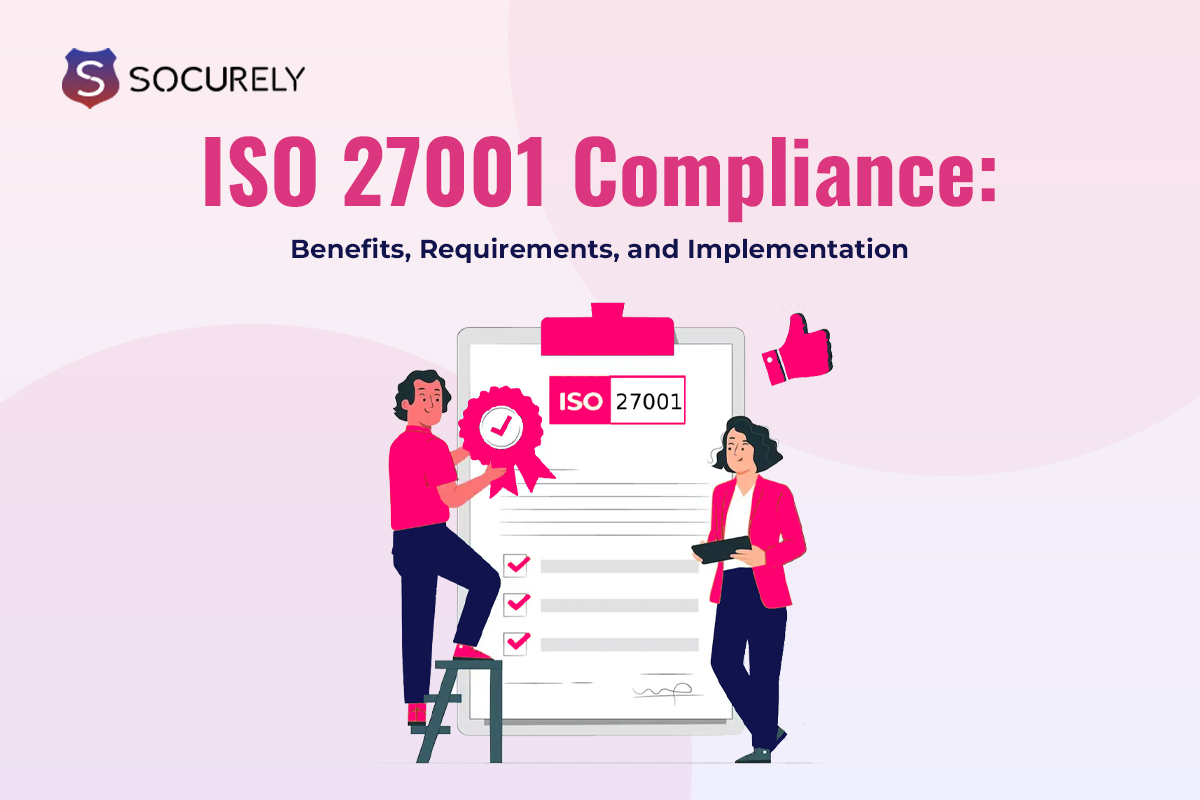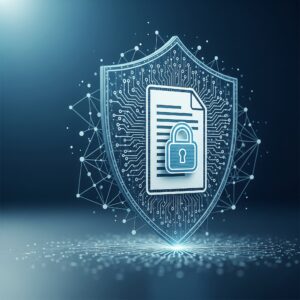There is no doubt that in today’s growing and volatile market, following safety with cybersecurity measures is paramount. Cybercrime is expected to cost the world $10.5 trillion by 2025, according to Cybersecurity Ventures. This staggering statistic underscores the need for robust information security measures. One of the most effective ways businesses can protect their data is by adhering to ISO 27001 compliance standards.
This comprehensive guide will walk you through everything you need to know about ISO 27001 compliance, from its importance to the implementation process.
What does ISO 27001 stand for?
ISO 27001 is part of the ISO/IEC 27000 family of standards, which are designed to help organizations manage their information security. The full title is ISO/IEC 27001:2013, and it stands for the “International Organization for Standardization / International Electrotechnical Commission 27001:2013“.
Founded in 1946, it is an apolitical multinational organization. Representatives from twenty-five nations convened to guarantee that boundaries between nations do not impede humanity’s progress toward dependable technological advancements.
Presently, ISO brings together standardization boards from 166 nations, with a central government based in Switzerland. This standard specifies the requirements for establishing, implementing, maintaining, and continually improving an information security management system (ISMS).
What Is ISO 27001 Compliance?
ISO 27001 compliance means that an organization meets the international standards set forth by ISO 27001 for managing and protecting sensitive company information. Maintaining confidentiality, integrity, and availability of sensitive company data involves a systematic approach.
The research states that-
British Airways was fined £183 million in July 2019 for their failure to stop a phishing attempt that exploited a phony copy of their website. In just two days, Marriott Hotels was penalized £100 million for allowing hackers to steal private information from poorly secured guest records.
Companies have to commit themselves to a comprehensive set of strict security standards to safeguard sensitive personal information. Also to protect from strict fines are imposed for avoidable data breaches by laws such as the General Data Protection Regulation (GDPR).
There are some common myths about ISO 27001 Compliance, Read the Truth- https://socurely.com/iso-27001-compliance-busting-common-myths-how-it-helps-businesses/
What Are ISO 27001 Standards?
ISO 27001 standards for small businesses and large enterprises outline the specifications for an effective ISMS. They provide a framework for policies and procedures that include all legal, physical, and technical controls involved in an organization’s information risk management processes.
Key components of the ISO 27001 standards include:
- Information Security Policy
- Scope of ISMS
- Procedure and Plan for ISMS Assessment
- Information Security Goals
- Proof of the Expertise of Information Security Personnel
- Information Security Risk Assessment and Treatment Outcomes
- ISMS Leadership Reviews of the ISMS; Results of Conducted Audits; ISMS Internal Audit Program
- Identification of Nonconformity Evidence
- Outcomes of Corrective Action
Why Is ISO 27001 Important?
Top Benefits Of ISO 27001 Compliance-
- Business Growth & Continuity
- Coordinated Controls
- Better Scope & Reputation
Risk Management: ISO 27001 offers a structured approach to identifying and managing information security risks, helping organizations proactively address potential threats and reduce the likelihood of data breaches.
Legal and Regulatory Compliance: Adhering to ISO 27001 ensures that organizations meet various legal and regulatory ISO 27001 requirements related to data protection, helping avoid fines and legal consequences.
Customer Trust and Confidence: ISO 27001 certification reassures clients that their data is secure, enhancing trust and confidence, and leading to stronger business relationships.
Improved Business Reputation: Achieving ISO 27001 certification signals to partners and customers that an organization follows best practices in information security, enhancing its reputation.
Operational Efficiency and Cost Savings: Implementing ISO 27001 can streamline processes, reduce redundancies, and prevent costly security incidents, leading to significant cost savings.
Continuous Improvement: ISO 27001 requires regular reviews and updates to security measures, ensuring organizations stay ahead of emerging threats and maintain robust protection.
Enhanced Incident Response: A clear framework for incident response helps organizations minimize the impact of security breaches, ensuring quick recovery and maintaining business continuity.
Global Recognition and Acceptance: ISO 27001 is internationally recognized and respected, opening up new market opportunities and enhancing credibility across different industries and regions.
What Are ISO 27001 Framework Controls?
ISO 27001 framework controls are a set of best practices that organizations should implement to protect their information assets. These controls are divided into 14 categories, covering areas such as:
- Information Security Policies- (A.5): In compliance with legal standards, infosec support is provided together with management recommendations.
- Organization of Information Security- (A.6): Creates a management structure to oversee information security deployment and operations. protects mobile devices and teleworking.
- Human Resource Security- (A.7): Ensures that stakeholders and staff are aware of and able to meet their security responsibilities. It mandates that workers disclose their security responsibilities when they move jobs.
- Asset Management- (A.8): Includes the identification, security, and unapproved access of assets.
- Access Control- (A.9): Assures permitted access, restricts access to data and data processing facilities, and holds users responsible for protecting data.
- Encryption and Management- (A.10): Guarantees effective application of cryptography to preserve data integrity and confidentiality.
- Physical and Environmental Security- (A.11): Prevents unwanted physical access to data and its processing facilities through environmental and physical security. Also, stops theft, loss, asset damage, and disruptions to corporate operations.
- Operations Security- (A.12): Protect data processing facilities against malware and data loss to ensure safe operation. mandates that businesses keep track of incidents and supporting documentation, stop the exploitation of technical flaws, and lessen the impact of system audits.
- Communications Security- (A.13): Data put on the network and its supporting infrastructure should be protected, and shared data should be kept secure
- System Acquisition, Development, and Maintenance- (A.14): Guarantee Information Security Throughout Its Life Cycle.
- Supplier Relationships- (A.15): Uphold service level agreements for the provision of information security services.
- Information Security Incident Management- (A.16): Make sure that issues about information security are handled consistently and effectively.
- Information Security Aspects of Business Continuity Management- (A.17): Make sure that security is maintained by incorporating it into systems for managing continuity and making it accessible in processing facilities.
- Compliance- (A.18): Avoid violating any legal or contractual security-related duties. Ensures that corporate rules and procedures are followed in the implementation and operation of security.
What is The ISO 27001 Implementation Process?
- Obtain Management Support: Ensure top management is committed to the implementation.
- Define the Scope: Determine the boundaries and applicability of the ISMS.
- Conduct a Risk Assessment: Identify, analyze, and evaluate risks to information assets.
- Develop a Risk Treatment Plan: Decide how to address identified risks.
- Establish the ISMS Policy: Create policies to support the ISMS.
- Implement Controls: Take the necessary measures and apply them to mitigate risks.
- Training and Awareness: Educate staff about their roles in the ISMS.
- Monitor and Review: Regularly check the ISMS’s performance and make improvements.
- Internal Audit: Conduct internal audits to ensure the ISMS is functioning correctly.
- Certification Audit: Undergo an external audit to obtain certification.
What is The ISO 27001 Certification Cost?
Generally, ISO 27001 Certification costs can range from a few thousand to tens of thousands of dollars. It’s important to consider both direct costs, such as certification fees and consultancy services, and indirect costs, such as internal resources and time spent on implementation.
Get ISO 27001 Compliance For Your Business
The process of obtaining ISO 27001 certification involves several steps, particularly if this is your first time obtaining conformity. You can review a detailed description of every step.
- Collaboration with stakeholders: Talk about your needs with the stakeholders and obtain a briefing from them.
- Evaluate risks: Examine, evaluate, and rank your risks.
- Fill in the gaps: Concentrate on your weak points, openings, and obstacles.
- Evaluate: Regular performance reviews ensure that everything is operating as it should.
- Audit and certification: Following implementation, an external auditor will assess your ISMS, leading to certification.
Socurely Can Help
ISO 27001 compliance is a strategic investment in your organization’s security and reputation. By following the steps outlined in this guide, you can achieve and maintain certification, protect your information assets, and build trust with your customers. With the support of experts like Socurely, the path to compliance is clearer and more manageable than ever.
At Socurely, we specialize in helping businesses achieve ISO 27001 compliance. Our team of experts provides comprehensive support, from initial risk assessments to final certification. We offer customized solutions tailored to your organization’s unique needs, ensuring a smooth and efficient path to compliance.
FAQ
Which three guiding concepts make up ISO 27001?
The three primary tenets of ISO 27001 are data availability, data integrity, and confidentiality. Maintaining confidentiality entails keeping information private and granting access to only those who are permitted. Integrity refers to the absence of tampering, alteration, or damage to data during transmission. Data should be available so that authorized users can access it as needed.
Can small businesses achieve ISO 27001 certification?
Yes, ISO 27001 is scalable and can be implemented by organizations of all sizes.
What are the requirements of ISO 27001?
Organizations must comply with clauses 5 through 10 and put in place the required controls listed in Annex A.
Which new security provisions are included in ISO 27001 2022?
Sections on security in ISO 27001-2022 are
- Threat analysis
- Data protection for cloud service usage
- IT preparedness for uninterrupted business operations
- Surveillance of physical security
- Management of configurations
- Erasure of information
- Data concealing
- Preventing data leaks
- Keeping an eye on things
- Internet filtering
- Safe code







